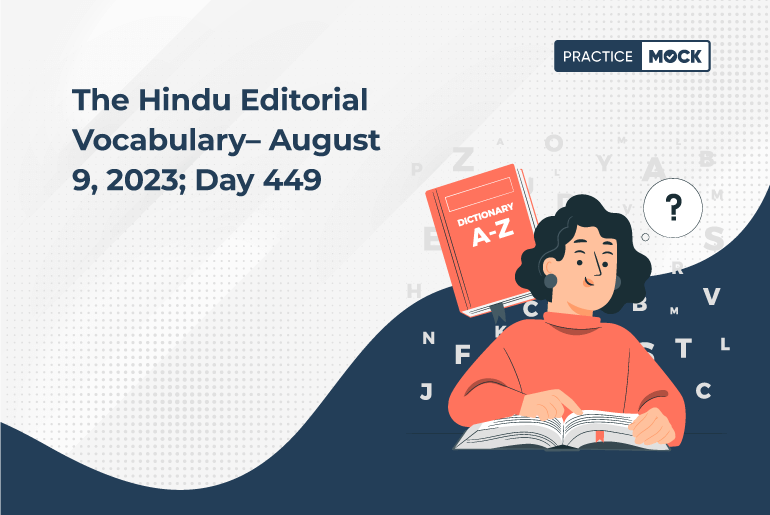| Difficult Word/ Phrase | Contextual Sense |
| Pretext | Something serving to conceal plans |
| Inflict | Make (someone) do something unpleasant |
| Ingrain | to implant or fix deeply and firmly, as in the nature or mind |
| Excavator | a powered machine for digging earth, gravel, sand, etc |
| Impunity | Exemption from punishment or loss |
| Suo motu | on its own motion; the term is usually applied to actions by a judge taken without a prior motion or request from the parties |
| Mince no word | to speak in a very direct and honest way without worrying about offending someone |
| Ruse | a way of doing something or of getting something by cheating somebody |
| Ambivalent | Uncertain or unable to decide about what course to follow |
| Raze | Destroy (a building or buildings) so as to make nearly level the ground |
| Portray | Describe in words |
| Fig-leaf | a thing intended to conceal a difficulty or embarrassment |
| Backdate | Make effective from an earlier date |
Communal punishment: On riots and demolitions
The Haryana government cannot use riots as a pretext (Something serving to conceal plans) to demolish Muslim homes
The idea of inflicting (Make (someone) do something unpleasant) collective punishment on the Muslim community soon after any riot or communal disturbance seems to be an ingrained (to implant or fix deeply and firmly, as in the nature or mind) part of governance in Bharatiya Janata Party-ruled States. The use of excavators (a powered machine for digging earth, gravel, sand, etc) to demolish houses, shops and other establishments has now spread to Haryana, after it was practised with impunity (Exemption from punishment or loss) in Madhya Pradesh, Uttar Pradesh and Delhi last year. The Punjab and Haryana High Court has done well to stop authorities from continuing with their demolition drive in Gurugram and Nuh, that witnessed communal clashes, leaving six dead. Taking suo motu (on its own motion; the term is usually applied to actions by a judge taken without a prior motion or request from the parties) cognisance of reports about the demolition activity, the Bench has minced no words (to speak in a very direct and honest way without worrying about offending someone) in raising the question whether the action is a sort of “ethnic cleansing”, as buildings belonging to a particular community were being brought down “under the guise of a law and order problem”. It has observed that there appears to be no order to demolish the buildings or prior notice to its occupants and that the law and order situation was just a ruse (a way of doing something or of getting something by cheating somebody). Few would disagree with the court’s characterisation of the action in Haryana. The same dubious and ambivalent (Uncertain or unable to decide about what course to follow) messaging about the demolitions that one saw in other States is being witnessed in Haryana too. For legal purposes, officials will say the buildings are encroachments and are being removed as per law. For political purposes, it is made very clear that rioters are getting the treatment they deserve.
It requires no special knowledge of the law to say the demolitions are inherently illegal in the absence of any process. It is not clear what evidence is being used to identify buildings belonging to alleged rioters or to ascertain whether those not involved are also using the premises. Reports suggest that personal belongings and inventory are not allowed to be removed before a building is razed (Destroy (a building or buildings) so as to make nearly level the ground). There is one example of a house that provided refuge to a family during the violence being demolished. Using communal violence as a pretext to impose extra-legal punitive measures will invariably lead to bias, as officials implementing such orders will have no choice except to portray (Describe in words) the occupants of the buildings to be razed as encroachers to retain the fig-leaf (a thing intended to conceal a difficulty or embarrassment) of legal justification and as anti-social elements for moral justification. In any case, to escape the charge of ignoring encroachments all this while and waiting for a riot to take action, they will have to provide evidence of serving notices on the occupants and, if needed, backdate (Make effective from an earlier date) such notices. The judicial intervention should put an end to the pattern of using the state machinery to inflict misery on a section of the population.
Want to improve your vocabulary further? Download the Lists of Word-Meanings of Previous Months here.
- Sign Up on Practicemock for Updated Current Affairs, Free Topic Tests and Free Mini Mocks
- Sign Up Here to Download Free Study Material
Free Mock Tests for the Upcoming Exams
- IBPS PO Free Mock Test
- RBI Grade B Free Mock Test
- IBPS SO Free Mock Test
- NABARD Grade A Free Mock Test
- SSC CGL Free Mock Test
- IBPS Clerk Free Mock Test
- IBPS RRB PO Free Mock Test
- IBPS RRB Clerk Free Mock Test
- RRB NTPC Free Mock Test
- SSC MTS Free Mock Test
- SSC Strenographer Free Mock Test
- GATE Mechanical Free Mock Test
- GATE Civil Free Mock Test
- RRB ALP Free Mock Test
- SSC CPO Free Mock Test
- AFCAT Free Mock Test
- SEBI Grade A Free Mock Test
- IFSCA Grade A Free Mock Test
- RRB JE Free Mock Test
- Free Banking Live Test
- Free SSC Live Test


